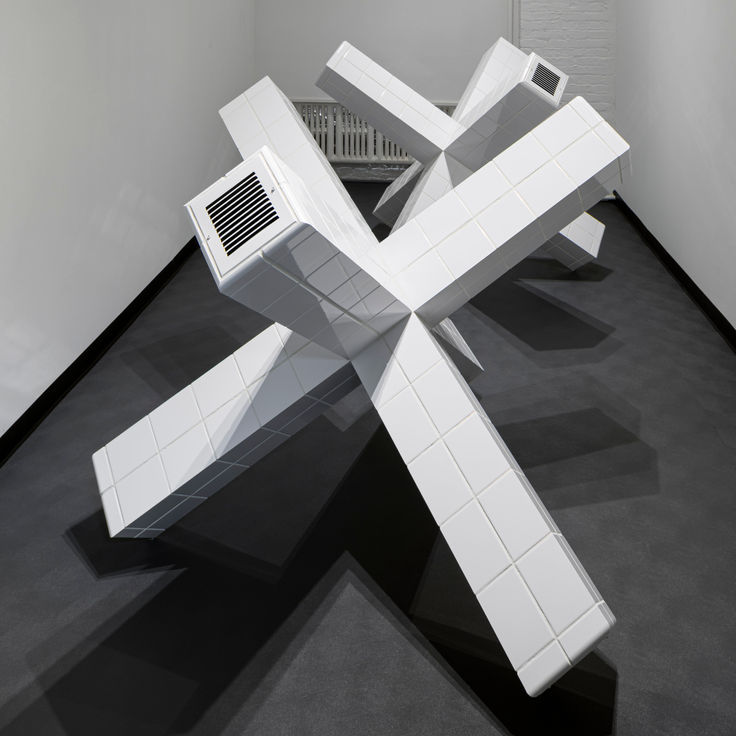Beyond the Pale
A site-specific sculpture installation at The Border Project Space, curated by Eva Mayhabal Davis.
Responding to a natural inclination towards society’s parameters, both physical and conceptual, Zac Hacmon studies barriers. In Beyond the Pale, Hacmon presents a series of sounds and sculptures.
With sound, a sense of the topography and voices seeps through the gallery. While the viewers’ body navigates a sculptural form in order to hear and find function. Stepping into a role that crosses back and forth, physically maneuvering amongst imposed barriers. The sculptures are in the form of a military hedgehog, a massive border fortification, of intersected ‘l’ beams. Their history traces back to the border fortifications used for the Atlantic Wall during World War II. The tile that defines their surface is reminiscent of the in-between spaces that Hacmon often makes. Creating a more palpable fortification that although overwhelming on-site, sits within the parameters for the viewer to listen to the sounds coming out from the vents in the sculpture.
During volunteering trips to the Arizona-Mexico border, Hacmon collected sounds each one reverberating from the vents in the sculpture. In one, the rustles of walking through the Sonoran Desert, following migrants’ trails during a water run to refill tanks maintained by the Humane Borders Humanitarian Organization. Other stories include: an anonymous asylum seeker and worker from the Casa Alitas Shelter and an undocumented worker recounting his journey across Arizona. There are also words of wisdom from Jose Rivera on the delineated border conflicts between the border and the US land relations with the Tohono O’odham Nation. Finally, a poem, shared by a member of the Tucson Samaritans: NO ANSWERS ––NOW OR EVER, dedicated to an unknown baby that died at milepost 19 on the Arivaca Road.
These forms and stories enter a complicated territory of history and land. The in-betweens, like corridors, valleys, and ultimately borders that are a consistent conflict in Hacmon’s work. For Beyond the Pale, he continues to work within this framework moving with a bird’s eye view and activating first hand. Seeing these enclosures of land as one of many markers of historical epochs. At one point, the British Empire established borders with pales, Irish territory was invaded and divided, the pale determining a governable side and ungovernable. In the same way that to this day the United States corrals its deemed ungovernable populations.
There are over 300 reservations for Native American nations and 2.3 million peoples in prison complexes including immigration detention centers. The border that separates the terrain between the USA and Mexico also impacts the wild life, channeling not just animals but people through even more dangerous gaps of desert terrain. Just along Arizona, according to Humane Borders between October 1999 and December 2018, 3339 migrant deaths were recorded, an inconceivable number in any which way and unimaginable through today.
The stories presented here vary in perspective but their strength and conviction for being in this in-between is defiant of the borders created by governments. The very human work and essence goes beyond any pale and the vessel the audience interacts with disturbs physical and psychological borders for empathy. This work will expand and continue.
We would like to thank the participating individuals for their generosity and time.
Sarah M. Reed, Program Coordinator at Casa Alitas Program – Aid for Migrant Families and Jose Rivera Director of Tohono O’odham Nation Culture Center and Museum. The poem is read by Gail Kocourek, a member of the Tucson Samaritans, the support of Humane Borders Humanitarian Organization and the anonymous contributions. We also acknowledge and thank the caretakers of the Sonoran Desert and Buenos Aires National Wildlife Refuge.
This project was supported, in part, by a Foundation for Contemporary Arts Emergency Grant and by the
Café Royal Cultural Foundation 2019 Fall Visual Grant.










